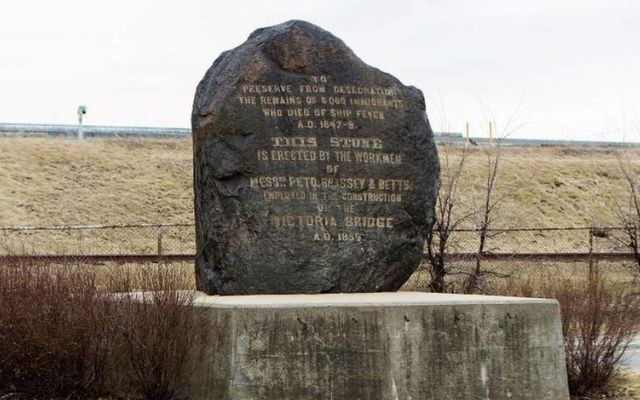An Irish Famine Monument in Montreal, Canada which sits between four lanes of heavy traffic, is finally expected to be given a memorial park.
The Black Rock, a stone monument in Point-Saint-Charles commemorating the Irish immigrants who died on their way to Canada, is to receive a memorial site after years of campaigning.
The local political party, Projet Montreal, is pledging to create a new memorial site which will include spending $15 million to move the street which currently runs around the site, an idea the city’s Irish community has long fought for.
Beneath the Black Rock lay the remains of some 6,000 Irish immigrants who contracted typhus aboard ships as they fled the Great Irish Famine to Montreal in 1847.
The stone monument currently sits on a median, in between four lanes of heavy traffic which runs over the cemetery. The only safe way for pedestrians to view the rock is from across the street and the Irish community has long argued that this is not a respectful commemorative site.
“We’re very happy with the announcement,” Victor Boyle, founder of the Montreal Irish Monument Park Foundation, said speaking to the Montreal Gazette.
“Unless Bridge St. is moved, the memorial would be meaningless,” he added. “How can you have a memorial that surrounds a cemetery with 6,000 bodies buried and have a street running over it?”
Projet Montréal Candidate Craig Sauve says if re-elected, the Plante administration will spend $15 million moving Bridge St, leaving enough space around the Black Rock for a fully accessible park.
"What was really important to the community is that we didn't move the Black Rock itself," said Sauve
But for Fergus Keyes, board member for the Montreal Irish Monument Park Foundation, an official announcement from the city is a major step forward in what has been a very long process.
"The administration of Denis Coderre, when he was the mayor, started it, and it continued now through the administration of Mme. Plant. So we would expect it to continue on regardless of who wins the election," said Keyes to CTV News.
Fergus Boyle commented that the park would also be a way to share the story of 1847 when residents came together to care for the sick immigrants during the typhus epidemic.
“I think it’s a story that demonstrates some of the values of Montreal — that solidarity, generosity, welcoming of new arrival, the immigrants to Montreal. It’s a beautiful story to tell. It’s an important story,” added Sauvé.
Work on the project would begin in 2025 and is expected to last two years.




Comments